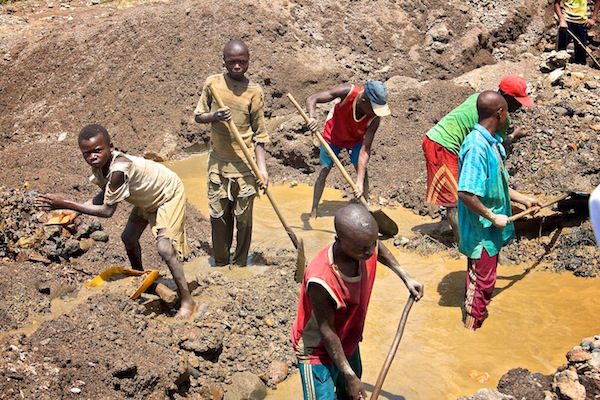On 24 October 2019, the Working Group on Extractive Industries, Environment and Human Rights (WGEI) held a panel on their background study on the operations of the extractive industries sector in Africa and its impacts on the realisation of human and peoples’ rights under the African Charter on Human and Peoples’ Rights. They also used this opportunity to launch the second WGEI Newsletter. The consultation was moderated by Commissioner Jamesina King, member of the WGEI.
The draft study in question considers the main challenges resulting from extractive industries in Africa, the underlying causes of human rights violations in this sector, the human rights framework provided by the African Charter and other regional and international instruments, as well as the gaps in the protection of human rights in relation to the activities of extractive industries.
Clément Voulé, member of the WGEI, addressed the background of the draft study report and the process followed by the Working Group to come up with the current text. He ended his presentation by stating: ‘States are responsible for the wellbeing of their citizens, therefore it is important that they adopt new policies to ensure the implementation of the study. Also, as Eritrea just did, we encourage States to share their experience regarding the implementation of the study, and more broadly the measures taken at the national level to ensure human rights are protected when it comes to the activities of businesses.’
Commissioner Solomon Ayele Dersso, Chairperson of the WGEI, provided an outline and an overview of the content of the study. Among other things, he focused on the importance to publish contracts concluded between States and multinationals and to take into account the rights of populations in negotiations and the fight against corruption. He recalled that ‘individuals have rights and States must take relevant measures taking into account the situation of their populations to reduce the impact of extractive industries on them and the environment.’
In many African countries, economic cooperation with transnational corporations is a source of revenue that accounts for a substantial share of foreign direct investment that, if managed sustainably, in respect of the rights set forth in the African Charter, can contribute to socio-economic development.
However, with the exponential increase in the exploitation and extraction of natural resources on the continent, there is a major risk of violations of human and peoples’ rights.
For the WEIG it is therefore urgent and necessary to:
-
put in place an effective legislative framework. There are still important gaps in the legal frameworks at the national level. States should adopt effective laws and regulations or reform existing laws in order to recognise and guarantee extractive industries’ obligations to ensure respect for human rights and for greater transparency;
-
ensure redistribution of resources. States must ensure transparency regarding the distribution of resources resulting from the contracts signed with extractive industries. An audit of the management of financial resources must be done and the results of this audit published. In addition, revenues from operations of extractive industries must be allocated among the national government, regional authorities and local communities;
-
have States fulfil their responsibilities. Contracts with extractive industries must respect the modalities and procedures of international laws such as the Rio Declaration on Environment and Development, to ensure that the rights of citizens and communities are at the center of responsible exploitation of natural resources. States must create mechanisms and regulatory bodies with the necessary powers to ensure that human rights, environmental and labor standards are respected. The exploitation of extractive industries generates a lot of income that is often diverted, this is why States must ensure that all individuals involved in corrupt practices and the embezzlement of public funds in relation to contracts signed with extractive industries are held accountable.
The purpose of the document is to help States ensure better governance in resource management, towards a prosperous and safe Africa for its people. This public consultation was an opportunity for all stakeholders, including States, national human rights institutions and civil society organisations to provide inputs in the process of developing the draft study report.
Comments and inputs on the draft study can still be provided here (until 30 November 2019): https://www.achpr.org/announcement/detail?id=75
Contact: Stéphanie Wamba, Africa Programme Advocate Consultant, [email protected]
Photo: Flickr ENOUGH Project Congo




